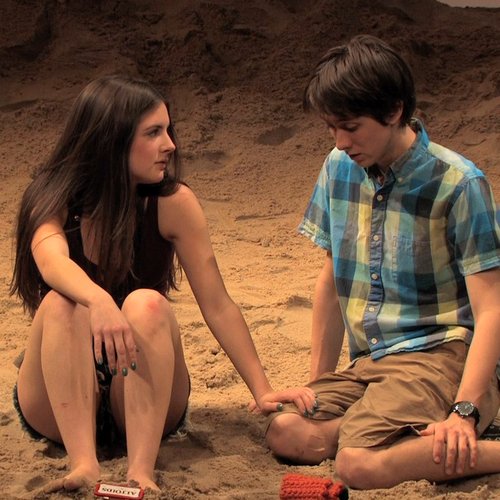Letter from Tim: Indian Summer

Daniel: I thought Comedies ended in marriage. Right? Isn’t that the like Significant Difference between Comedy and Tragedy? In Tragedy people die and the Horrible Truth is revealed—
Izzy: what horrible truth
Daniel: about, like, how powerless human beings are about how like we think we’re in control of our lives and destiny and meanwhile the Gods are like: “Fuck You, Mortal. Fuck You, Mortal, Fuck you—” I guess this is a Tragedy with a Comic ending. Or a Comedy with a Tragic ending.
—Gregory S. Moss, Indian Summer
Greg knows what he’s doing when his primary characters, Izzy and Daniel, stumble into their uncertain final scene and seek to define their story in literary terms. As audience members, we have been pleased to have been set up for a romantic comedy. Two teenagers from different worlds start off stubborn and angry, then give each other a second look. And what opens them up — and this is true of all the great comedies — are the flecks of idealism and self-definition they find in each other’s eyes. But this being 2016, all does not end well. The lines between genres blur. And actually, when you look closely at the great comedies and tragedies of Shakespeare, the lines between his genres are not as impermeable as they seem. In both, humans often seem like fools before nature and time. Time knocks us off our pedestals, exposes our foibles, and quite frequently lays us low. But comedies end with beginnings, where characters acquiesce to the laws of nature. Tragedies end with endings, endings that allow us better to understand our relationship to nature and time. In Indian Summer, all these things happen, but in the least ostentatious way.
There is a grace and, yes, an inherent theatricality to these romantic exercises of the young.
Indian Summer yields its pleasures almost immediately. Its vivid, pugnacious characters deliver the play’s smart, breezy banter effortlessly and draw us in. Yet the further we get into it, the deeper it gets. Plays about young characters, at their best, come with automatically high stakes. Shakespeare surely knew this too. Everything is high drama for the young. That’s why we love them and laugh at them. Greg’s Playwright’s Perspective also hits upon this truth as he describes the inexhaustible permutations young brains spin out in trying on potential relationships. This violent collision of teen ego and empathy accounts for both the ludicrous posturings and the poignant, stormy, beauteous yearnings of teen romance. There is a grace and, yes, an inherent theatricality to these romantic exercises of the young. Greg’s play artfully dramatizes this “playfulness” in a developing trope of play-acting throughout the play. Characters frequently volunteer to role play awkward scenarios for each other. The initial scenes like this are mainly just fun. But as the trope continues, the commonality they discover and the empathy they engender draw them closer together. These scenes also inferentially celebrate the theatrical event that contains them and allow the play to stray further from the reins of realism that seemed initially to tether the play to its distinct Rhode Island backdrop. Daniel’s grandfather, George, who serves as the play’s de facto narrator in many respects, leads us beautifully into a reflective consideration of the play’s dawning lyricism. The term, “Indian Summer,” he tells us, refers to a dreamy period of time carved out between summer and fall, a time that seems to stand still and live forever. (His description of it reminds me of A Midsummer Night’s Dream.) In a way, the play itself seems similarly carved out of time: etched in our memories, resonating with our own stories, the kind of play I can’t wait to see over and over. I am pleased to serve it to you as our last play of the season for it to linger in your thoughts through the summer.
Tim Sanford
Artistic Director


